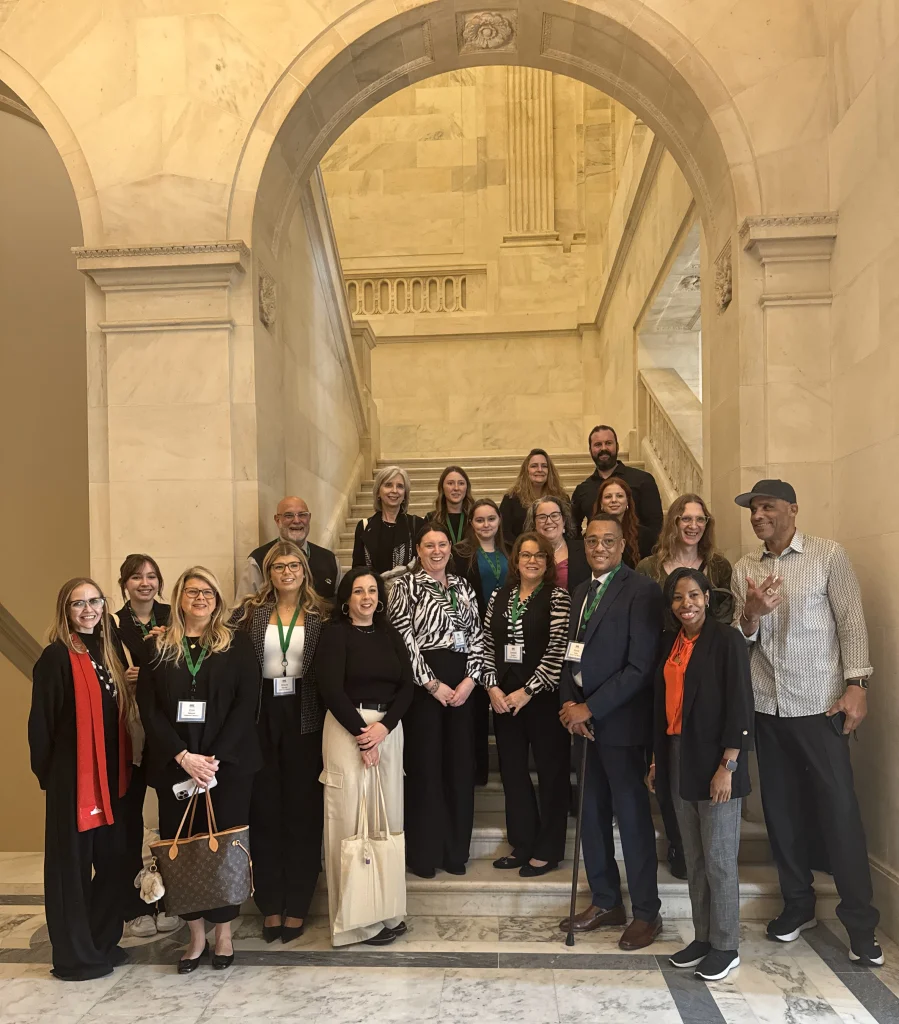
“You’re not alone. That’s what I want you to see. This is a community that understands you, a community that gets you, a community that knows what you are going through.”
– James Griffin, Advocacy Chair, Rare Disease Week 2025 (sickle cell disease)
For the past 14 years, the rare disease community has gathered on Capitol Hill for Rare Disease Week, hosted by the EveryLife Foundation for Rare Diseases. The week is designed to unite advocates, equipping them with the knowledge and resources needed to drive meaningful policy changes for the rare disease community. This year, many of the talks emphasized the power of that community.

“It’s very easy to underestimate how large the rare disease community is,” said IRSF’s Family Engagement and Advocacy Manager, Katie Busch, who attended the event. “This week is a good reminder of the sizable impact we can have when we work together – there is definitely power in numbers.”
According to the National Organization for Rare Disorders (NORD), a rare disease is defined in the U.S. as a disease, disorder, illness, or condition that affects fewer than 200,000 individuals. While each of the 10,000+ identified rare diseases – including Rett syndrome – are rare, collectively, the rare disease community is formidable, comprised of more than 30 million Americans, roughly 10 percent of the total population.
“Each rare disease comes with its own unique set of challenges for both the individual affected and their care team,” Katie said. “But coming together like this, you really get a sense of the overlap. So many of the challenges we are facing in the Rett community are ones that other rare disease communities are facing as well.”
According to NORD, rare disease is a public health issue, but we lack the data to prove it. To showcase the significant unmet needs of the rare disease community, NORD has launched a survey-based study called Living Rare. The study looks to gather stories from people living with a rare disease in the U.S., find solutions, and advocate for greater support. Anyone living or caring for someone with a rare disease is encouraged to share their experience.
The stories and shared experiences were what stuck with Katie as she reflected on her time on Capitol Hill. As the longtime para and caregiver of a young woman with Rett syndrome, Katie was able to take her own lived experience with Rett to her Missouri representatives. She was joined by other caregivers, individuals with rare diseases, and nonprofit organizations as she met with members of the House and Senate. She left the meetings feeling heard and hopeful that her representatives would offer their support.

“There were nearly 1,000 people who showed up ready to advocate for the rare disease community,” she said. “Being in the same room as them and aligning our legislative asks so that we can do the most good for the community as a whole – it was really powerful. As we continue to monitor policy decisions, it’s so important that we keep showing up, supporting one another, and sharing our stories.”
While the federally led FDA-NIH Rare Disease Day was postponed, all events led by the EveryLife Foundation’s Rare Disease Legislative Advocates went on as scheduled. Before sending advocates out to meet with policymakers, Annie Kennedy, the foundation’s chief of policy, advocacy, and patient engagement, had this message for the group:
“As those in this room know, where a diagnosis once meant there is nothing to do, we all now know there is much that can be done, which is why we are here today.”
Rare diseases aren’t going away, and neither are we. If you have any questions about how IRSF advocates for families or want to talk about ways you can get involved, please get in touch.
Get Started Today – Ways to Get Involved
Share Your Story
What is your favorite thing about your loved one, friend, or neighbor with Rett syndrome? What would you like others to know about them? We know that it can be vulnerable to share, but doing so in our Rett community is a great place to start. You never know who you might inspire. As James Griffin, advocacy chair for this year’s Rare Disease Week, said:
“Stories are powerful. Stories can get people moving and moving into action. And I believe stories are the driving force of change. The time for change is now because as people who live with rare diseases, we don’t have the luxury of time … we can’t afford to wait.”
Share your story with us at rettsyndrome.org/share and contribute to NORD’s survey-based study, Living Rare.
Join Us on Capitol Hill Next Year!
We would love to see more of a presence for Rett syndrome at the 2026 Rare Disease Week (February 24-26). There is no cost to attend the event apart from travel and hotel expenses. If you are interested in participating in next year’s event, please reach out to Katie.
Give to Support Our Mission
Our work of advocating for families and strategically funding innovative research is only possible thanks to the many donors who make our mission possible. Give now to help us continue our efforts on behalf of every Rett family.
Thank you to the following elected officials who met with Katie and her fellow Missouri advocates to learn about the impact of a rare disease like Rett:
Rep. Ann Wagner (R-MO)
Rep. Bob Onder (R-MO)
Rep. Wesley Bell (D-MO)
Sen. Eric Schmitt (R-MO)
Sen. Josh Hawley (R-MO)
